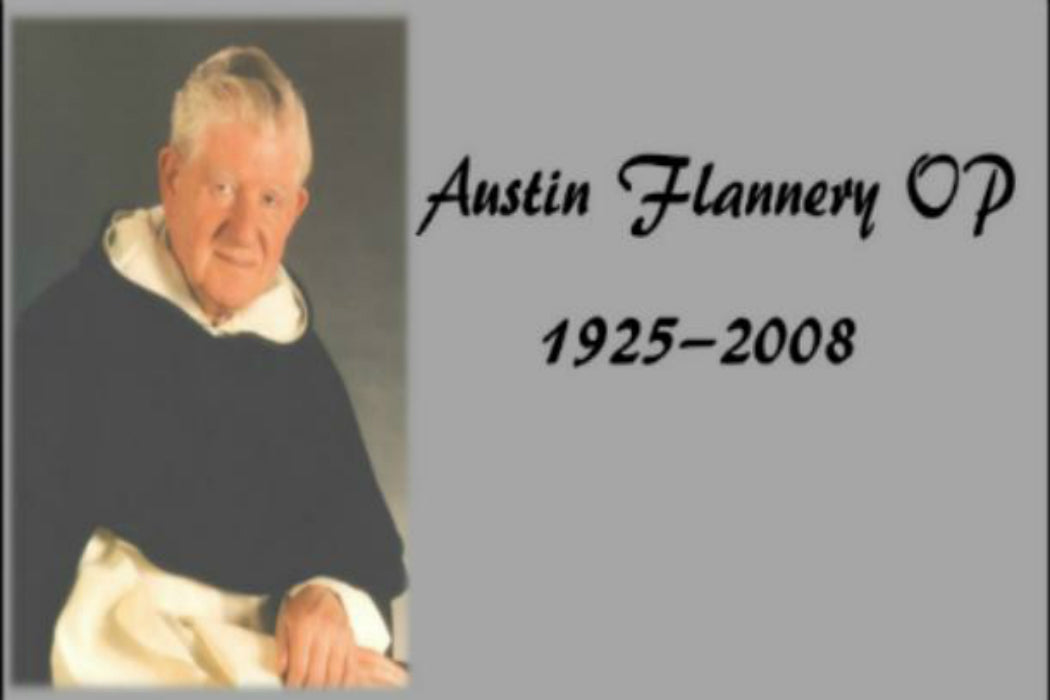Austin Flannery OP - Tenth Anniversary

Image: Austin with Archbishop Desmond Tutu, of Capetown, and marks his involvement in the anti-apartheid movement.
Immediately on taking the editor’s chair, Austin started a new section in the magazine in which he published translations of papal documents, expanding it greatly when Pope John XXIII called a council of the Church. Thus, Doctrine and Life published English translations of the preparatory documents for the Council, and, as they were promulgated, the Council documents themselves. And throughout the 1970s Austin translated and published the documents which implemented the details of the changes in Church life provided for in the Council documents. This concentration on documentation paved the way for the works for which he was best known, Vatican Council II: The Conciliar and Post-conciliar Documents. This acquired quasi-official status when the then Cardinal Joseph Ratzinger directed that it be employed in the English language translation of the Catechism of the Catholic Church. In 1996 there followed a book of the Council documents only, a new translation in inclusive language, Vatican Council II: Constitutions, Decrees, Declarations. 
Image: Austin presenting a specially bound copy of the Vatican II docs to Cardinal Basil Hume Archbishop of Westminister
One of Austin’s most endearing and valued qualities was his capacity for friendship. No matter what the circumstances in which you first met him, you were accepted as a friend and drawn generously into his extraordinarily wide circle of friendships and interests. Foremost among those were journalists who shared with him in making Vatican II known and understood – the late Kevin O’Kelly, Seán Mac Réamoinn and Louis McRedmond. The fourth of that band, John Horgan, is still with us, and in a tribute to Austin at the time of his death wrote: ‘Austin told me of one incident in his family which, I suspect, had more than a passing influence on his sturdy independence of spirit, and offers a clue about his irreverent but always warm and non-injurious sense of humour. It was during the Civil War (I think) when the Flannery family was attending a Sunday Mass at which the parish priest cut loose with an avowedly political sermon. Austin’s grandfather mounted a unique form of protest, rising in his place and standing there silently until the attention of the entire congregation was focused on him and the priest was forced to realize that he had quite lost his audience.
“Flannery”, he said from the pulpit, “will you sit down!”
“I will, father”, Flannery père replied, “when you start preaching the Word of God, and not a moment before!”
John Horgan concluded: ‘Today we need people like the Flannerys – father and son – as much as ever. And the memory of Austin will continue to inspire all who knew and loved him.’ 
Image: Austin with his niece, Sister Edel Murphy OP.
Allied to Austin’s capacity for friendship was his infectious sense of humour. This combination stood him in good stead at the time of an ‘Outlook’ television programme in the 1960s which led to him being subjected to furious political criticism. This was the occasion when Charles Haughey, then minister for finance, speaking in the Dáil, dubbed him a ‘gullible cleric’, for featuring Michael O’Riordan, secretary of the Irish Communist Party alongside Fr Michael Sweetman, S.J., in discussing housing problems in Dublin. Whenever afterwards there might be a suggestion that he was a communist, Austin liked to respond that sitting down to talk with Michael O’Riordan made him a communist no more than sitting down with Michael Sweetman made him a Jesuit.
Despite the elements of controversy that on occasion attached themselves to his name, Austin retained the confidence of his brethren. This was seen in his being twice elected prior of St Saviour’s, where he lived from 1957 to his death, and being elected a member of the Provincial Council. The high point of his recognition by the Order came in 1995 when the then Master, Fr Timothy Radcliffe, conferred him with the Order’s highest academic award, the STM. This is given in recognition of published contributions to theology, and at the request of the Provincial Chapter.
A native of Rear Cross, Co. Tipperary and the eldest of his family, Austin was educated at St Flannan’s, Ennis, and at Newbridge College before entering the Order in 1946. He studied theology at St Mary’s, Tallaght, Blackfriars, Oxford, and the Angelicum, Rome. For some years after ordination he taught Latin at Newbridge and theology at Glenstal Benedictine Abbey, before being appointed to Dominican Publications in 1957, the work to which he committed the remainder of his life.
All of Austin’s activities – writing, editing, publishing, campaigning – were born of a deep commitment to the Gospel which convinced him of the need to contribute with all his might to building a new heaven and a new earth. Large in frame, he was large also in his vision of what God’s grace could accomplish and large in his commitment to being a preacher of that grace.



